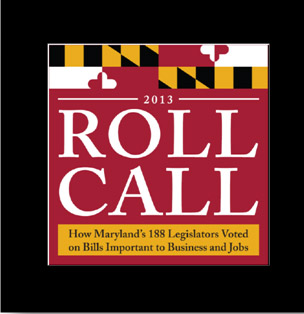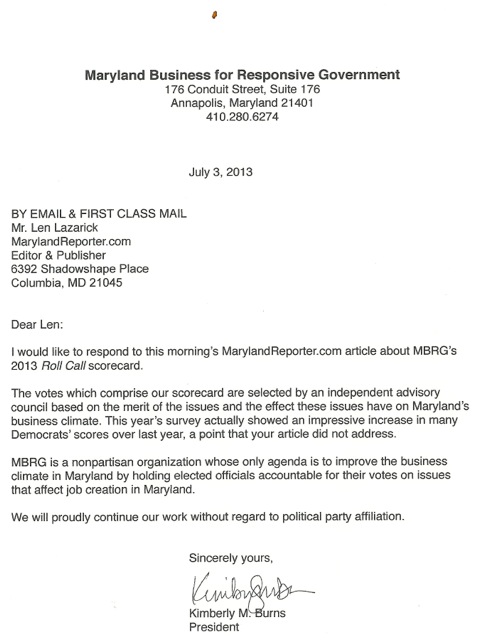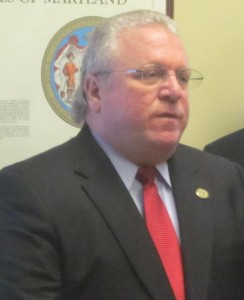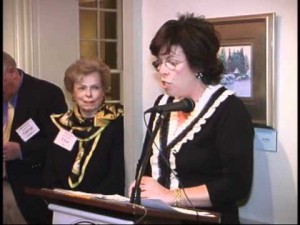Business group gives low marks to many Md. lawmakers, mostly Democrats
By Meg Tully
 A Maryland business group rating state lawmakers in its annual scorecard released Tuesday gave low marks to the two Democrats leading the Maryland General Assembly, typifying how business organizations view the legislature as a whole.
A Maryland business group rating state lawmakers in its annual scorecard released Tuesday gave low marks to the two Democrats leading the Maryland General Assembly, typifying how business organizations view the legislature as a whole.
In the Roll Call report it’s been doing since 1987, Maryland Business for Responsive Government gave House Speaker Michael Busch a 29% in 2013, and Senate President Mike Miller fared slightly better at 40%. Busch has a 47% cumulative score, and Miller has 56%.
“Technology companies, cybersecurity companies and other select special commercial interests declared 2013 to be a victorious legislative session for business,” said the report. “For them, it meant more government investment in their industries, which breeds more innovation and more jobs, as the argument goes.
“But to other businesses in Maryland, 2013 meant higher taxes, more overburdensome regulations, fewer employees and a bigger bottom-line struggle to remain a going concern. It’s a deep divide in the underpinning of Maryland’s economic development climate.”
MBRG is made up of companies, chambers of commerce and other business and trade organizations. It rated senators and delegates for their votes on key bills for the roll call. The ratings vary from 0% to 100%.
Comparing average scores by party
UPDATE: As MBRG points out in a response to the initial posting (see below), Democrats did overall improve their scores from 2012. But in many cases, their 2012 scores were in the single digits or teens, some of the worst marks of this four-year term.
Twenty-two of the Senate’s 35 Democrats improved their scores this year over last, and for 10 of them this year’s scores were better than their cumulative ratings. In the House of Delegates, 81 of the 98 Democrats improved their scores from 2012, and 39 did better than their cumulative rating.
Cumulative ratings cover dozens of votes even for freshmen lawmakers and scores of votes for veterans. In the state Senate, the cumulative score for Democrats is 39%, and only 8 of the 35 have scores above 50%, including Miller. The average score for Republican senators is 90%.
House Democrats have an average cumulative rating of just 30%. The average cumulative score for Republican delegates is 89%. END OF UPDATE
“I am very proud of my pro-business voting record,” said Del. Anthony O’Donnell, the Republican leader during the session, scoring a 100% rating this year. “I know businesses in my district, whether they are large businesses or the small mom-and-pop shop on the corner, are the ones who provide jobs for my constituents.”
High, low scorers
O’Donnell was one of 18 delegates who earned a perfect score, as did Senate Minority Leader E.J. Pipkin in the Senate. Anne Arundel County Sens. Ed Reilly and Bryan Simonaire also scored 100%. .
The lowest score in the General Assembly went to Del. James Malone, a Baltimore County Democrat who got a zero. But his score reflected a lot of missed votes that happened when he was taken ill with pneumonia during session, he said.
Malone maintains a 44% for his overall score after serving in the House of Delegates 19 years, something he said he was proud of as a “union man.”
“I’m one of these that feel I have to meet everybody halfway,” Malone said. “Having close to 50 percent, I’m happy with that.”
Group concerned about unpaid wages liens, windpower
Kimberly Burns, president of Maryland Business for Responsive Government, said that the scorecard helps keep public officials accountable to business and industry.
This year, the group is particularly concerned with a new law that will go into effect Oct. 1. That law will allow employees to seek liens against employers for unpaid wages – a move that Burns predicts will hit many employers and will be costly to defend.
The group’s state advisory council sifted through more than 225 pieces of legislation to select the dozen bills that were ultimately included in the scorecard. Burns said they chose the most critical votes to business and indicators of Maryland’s business climate health as a whole.
Among the hot-button issues was an initiative led by Gov. Martin O’Malley to add offshore wind power in Maryland. The bill was criticized by MBRG for tacking $1.50 per month on residential bills and another 1.5% annually for commercial customers’ costs — but only if the coastal wind turbines are actually built.
 Democrats praised, but Republicans led the pack
Democrats praised, but Republicans led the pack
The nonpartisan scorecard made a point to highlight Democrats with high scores, although Republicans claimed top slots in the ratings. In the House of Delegates, Democrats Del. Sally Jameson and Del. John Wood, both from southern Maryland, tied for top Democratic rating with a score of 76%. In the Senate, Baltimore County Sen. Bobby Zirkin was the highest Democrat with 80%, though his cumulative score is only 39%.
But O’Donnell said Democrats as a whole did not perform as well as Republicans, particularly those in leadership positions.
“Those scores are reflective of what we hear anecdotally, that Maryland is hostile to business,” he said.
That sentiment was also reflected in a Facebook post by Del. Susan McComas, a Harford County Republican who wrote she was trying not to break her arm patting herself on the back for her 100%score.
“Unfortunately the Governor and the Annapolis leadership did not get a 100% rating,” McComas stated. “This is not good for the economic health of Maryland.”
Rain tax big business issue for senator
On the Senate side, Simonaire, an Anne Arundel County Republican who was among the 100% ratings, said one of his best votes on the scorecard related to the “rain tax,” a fee that is being included on property tax bills for stormwater management.
He blasted the House of Delegates for rejecting a Senate plan that would have delayed the rain tax by two years. “We don’t need more taxes,” he said in an e-mail.

MarylandReporter.com is a daily news website produced by journalists committed to making state government as open, transparent, accountable and responsive as possible – in deed, not just in promise. We believe the people who pay for this government are entitled to have their money spent in an efficient and effective way, and that they are entitled to keep as much of their hard-earned dollars as they possibly can.


